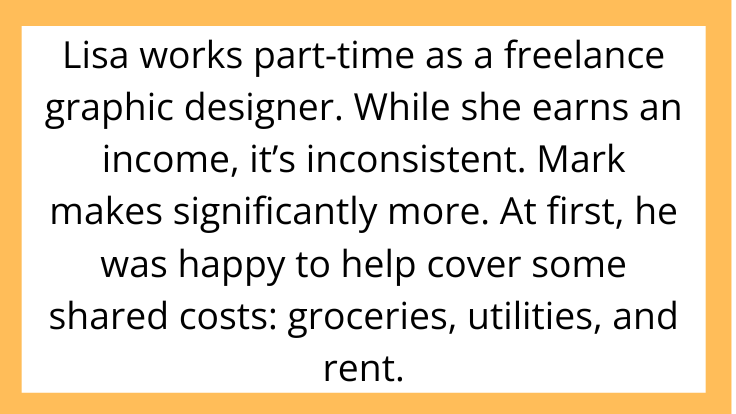AITAH for Not Wanting to Pay for My Girlfriend’s Shopping After She Moved In With Me?
Moving in together is a huge milestone in any relationship. But what happens when love and finances collide? Today’s AITAH story dives into a situation that’s sparking heated debate: Are you obligated to fund your partner’s lifestyle just because you share an address?
Let’s explore the drama.
The Backstory: From Dating to Cohabiting

The original poster, whom we’ll call Mark, is a 32-year-old software developer who has been dating his girlfriend, Lisa, for about two years. A few months ago, Lisa, 29, moved into Mark’s apartment after her lease ended. The decision seemed natural—they were spending most nights together anyway, and living together would save them both time and money.
Or so Mark thought.
Lisa works part-time as a freelance graphic designer. While she earns an income, it’s inconsistent. Mark makes significantly more. At first, he was happy to help cover some shared costs: groceries, utilities, and rent.
But then Lisa started expecting more.
The Conflict: The Shopping Spree

Mark noticed that Lisa’s spending habits changed almost immediately after moving in. She began ordering expensive skincare, new clothes, and home decor almost weekly. Packages piled up by the door, and the shared credit card—which they agreed to use only for necessities—was soon maxed out.
When Mark brought it up, Lisa was offended.
She argued that since he earned more, it was only fair he cover most expenses. In her words:
“You’re practically my husband now. Isn’t it your job to take care of me?”
Mark disagreed. He felt taken advantage of. He reminded her that he was happy to split costs and help with essentials, but he didn’t sign up to be her personal bank account.
Lisa accused him of being stingy and unsupportive. She claimed he was humiliating her by “nickel-and-diming” when he could easily afford it.
Mark turned to Reddit’s r/AITAH community to ask: Am I the villain for refusing to bankroll her lifestyle?
Reddit’s Verdict: Boundaries Are Not Selfish

The AITAH community came out overwhelmingly on Mark’s side. Here’s why:
It’s About Agreements, Not Entitlement
Most commenters agreed that moving in together does not automatically merge finances in a way that obligates one person to subsidize the other’s discretionary spending.
One top comment put it bluntly:
“If she wants a shopping budget, she needs to pay for it. Love doesn’t mean unlimited money.”
Unequal Income Isn’t a Blank Check
While some couples choose to pool all resources, it has to be mutually agreed upon. Mark never consented to being Lisa’s sole provider, and she never discussed shifting their arrangement before she started spending.
Several Redditors pointed out that Lisa’s expectations are more typical of a marriage—and even then, they require clear communication.
Money and Relationships: Why Clarity Matters

This story is a perfect example of why financial transparency is critical before cohabitation.
Here are some key takeaways:
-
Define Shared Expenses: Sit down and list exactly what will be shared (rent, bills, food) and what remains personal (clothes, hobbies).
-
Set Spending Limits: Agree on a monthly budget to avoid surprises.
-
Respect Income Differences: If one person earns more and wants to contribute more, that’s fine—but it should be voluntary, not demanded.
-
Discuss Future Plans: Are you moving toward marriage or staying unmarried? Expectations shift depending on long-term commitments.
Mark and Lisa skipped these conversations. The result? Hurt feelings, resentment, and confusion.
What Should Mark Do Next?

Reddit users overwhelmingly encouraged Mark to:
-
Have an Honest Talk: Clearly outline what he can and cannot pay for.
-
Establish Boundaries: Decide whether shared finances are appropriate at all.
-
Consider Compatibility: If Lisa cannot respect boundaries, this may be a sign they have fundamentally different expectations.
When Generosity Becomes Obligation

It’s one thing to help a partner in need. It’s another to feel pressured into funding luxuries just because you earn more.
Mark’s desire for boundaries doesn’t make him cheap or uncaring—it makes him responsible. Generosity should come from love, not guilt.



